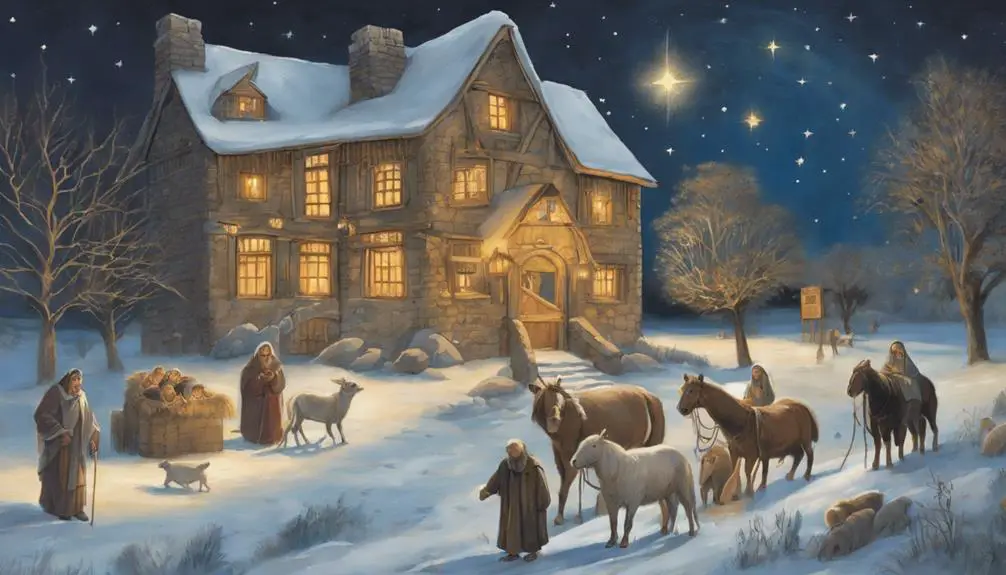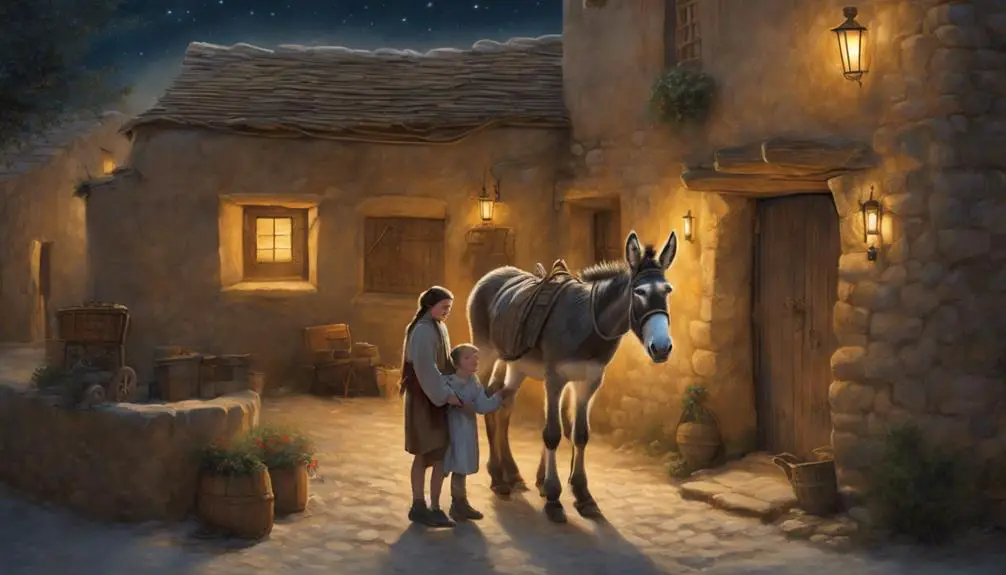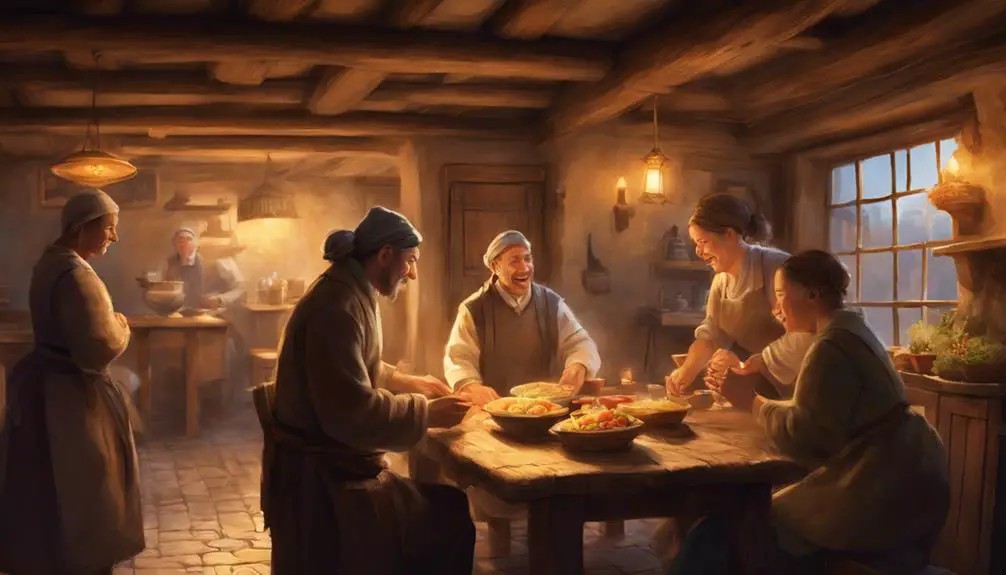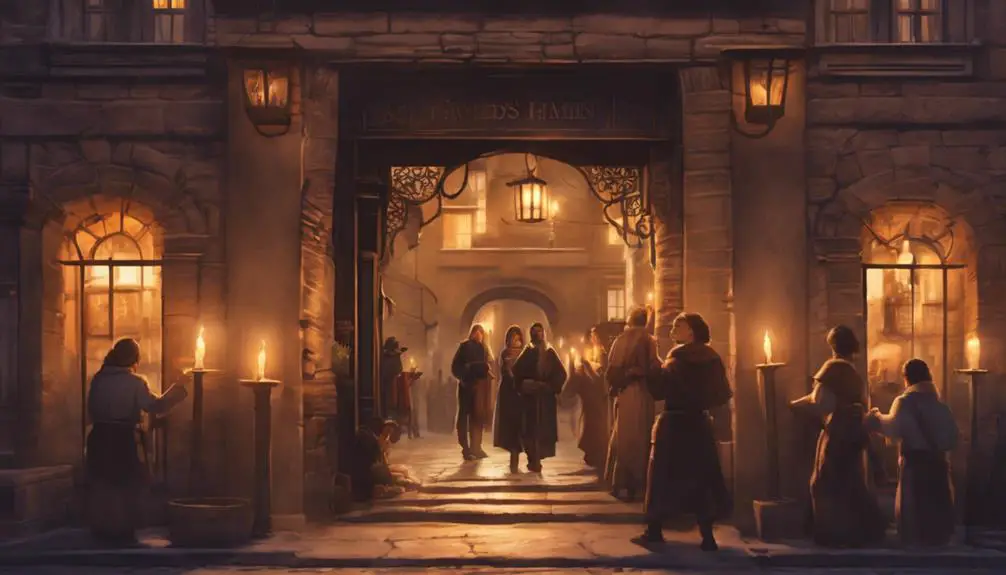Probe the intriguing absence of the innkeeper in the Bible, unraveling layers of hidden meanings and cultural interpretations.

The Innkeeper in the Bible
You might be surprised to learn that the Bible doesn't explicitly mention an innkeeper in the nativity story, a detail often assumed in popular retellings. This omission invites you to consider the role and identity of this character through a different lens, exploring not just the literal text but the rich tapestry of symbolism and interpretation that has evolved over centuries.
As you reflect on what this could mean, think about how this shifts your understanding of hospitality and its implications in modern contexts. This exploration might challenge your perceptions and open up a new avenue of thought.
Key Takeaways
- The Bible does not explicitly mention an innkeeper in the Nativity story.
- Traditional narratives about the innkeeper reflect interpretations rather than biblical accounts.
- The concept of an "inn" historically referred to guest quarters in a private home, not a commercial establishment.
- The innkeeper's role, while not detailed in scripture, symbolizes broader themes of hospitality and societal responsibility.
The Biblical Account Examined

Delving into the biblical account, we find no direct mention of an innkeeper during the nativity story, challenging common perceptions and inviting a closer examination of the text. You're likely familiar with the traditional Christmas narrative portraying Mary and Joseph being turned away by an innkeeper, but a thorough review of scripture reveals no explicit reference to such a character. This absence prompts questions about the historical context and potential scriptural discrepancies that have led to widespread assumptions.
The term often translated as 'inn' in modern retellings actually refers to a guest room in a private home, not a public lodging place as we might imagine today. This detail is crucial for understanding the setting of Jesus' birth and highlights the importance of examining the original language to grasp the true scenario. The narrative's focus is on the lack of space in these guest quarters, which resulted in Mary and Joseph finding refuge in a place where animals were kept.
Considering the historical context, it's essential to recognize that hospitality was a deeply ingrained value in the culture of the time. Guests were typically accommodated in family homes rather than commercial inns, which were scarce and often viewed with suspicion. This understanding challenges the modern interpretation and sheds light on the conditions Mary and Joseph faced.
Who Was the Innkeeper?

Given the lack of explicit mention in scripture, the question of who the innkeeper was, if they existed at all, invites a deeper investigation into the cultural and historical context of the time. You're delving into a narrative where the innkeeper's identity is shrouded in mystery, primarily due to the Bible's focus on the broader message rather than the specifics of each character.
Understanding the innkeeper involves considering several factors:
- Cultural practices of hospitality: In ancient times, hospitality was a highly valued practice. An innkeeper would have played a crucial role in this system, offering shelter and comfort to travelers.
- Economic standing: The innkeeper's role also hints at their potential economic standing in society. Running an inn could suggest a level of wealth and stability, providing a service essential for commerce and travel.
- Historical context: The time of Jesus' birth was marked by Roman census, leading to overcrowded towns. An innkeeper would have been under pressure, balancing the demand for space with the need to maintain order and resources.
- Religious and social duties: The innkeeper, by virtue of their profession, would have been at the intersection of various religious and social duties, making their role complex in the narrative.
Exploring the innkeeper's identity is more than a quest for a name; it's an exploration of the roles individuals played in a society that valued community, hospitality, and mutual support. The historical context enriches our understanding, painting a picture of daily life that frames the innkeeper not just as a character in a story, but as a pivotal figure in the backdrop of one of history's most recounted events.
Symbolism and Interpretations

Moving beyond the historical and cultural backdrop, let's explore the rich symbolism and varied interpretations surrounding the innkeeper's role in the biblical narrative. To understand the depth of this character's impact, it's crucial to consider the cultural context and the narrative role they play. While the Bible doesn't delve deeply into the innkeeper's personality or motivations, this figure has become a symbol of various human attitudes and responses to divine intervention and human need.
The innkeeper, often seen as a peripheral character, actually embodies significant lessons about compassion, societal responsibility, and the complexities of human nature. In the cultural context of the time, offering shelter and hospitality wasn't just a courtesy but a moral obligation. The narrative role of the innkeeper thus becomes a mirror reflecting societal values and individual morality. Through this lens, interpretations of the innkeeper's actions range from a critique of societal failure to recognize and respond to the needs of others, to a more sympathetic understanding of the limitations and challenges faced by individuals in providing help.
Analyzing the innkeeper's role illuminates how biblical stories use seemingly minor characters to convey profound moral and ethical teachings. The symbolism attached to the innkeeper's actions—or inactions—invites readers to reflect on their own responses to those in need and the broader implications of hospitality and compassion in their lives. This analytical journey through the innkeeper's narrative role enriches our understanding of the biblical text and its application to modern life, encouraging a thoughtful examination of our personal and collective moral compass.
Lessons in Hospitality

Exploring the innkeeper's narrative further, we uncover invaluable lessons in hospitality that resonate deeply with both ancient and modern audiences. This story, though brief, holds profound teachings about the essence of welcoming others, deeply rooted in cultural norms and a generosity ethic that transcends time.
First, let's consider what the innkeeper teaches us:
- Understanding cultural norms: The innkeeper's actions offer a window into the societal expectations of hospitality during that era. It shows us how deeply ingrained the duty to welcome and care for travelers was, pushing us to reflect on our own cultural practices around hospitality.
- Flexibility in offering help: Despite the innkeeper's limited resources, there's a lesson in making do with what's available to assist others. This flexibility is a cornerstone of genuine hospitality, emphasizing the importance of effort over perfection.
- Generosity ethic: The narrative underscores a generosity ethic that goes beyond mere obligation. It's about willingly giving of oneself and one's resources, highlighting the value of selflessness in our interactions.
- Building community through kindness: Finally, the innkeeper's story teaches us that hospitality is a powerful tool for building community. By opening our doors, we open our hearts, fostering connections that can bridge the widest divides.
Through these lessons, we grasp that hospitality isn't just about providing shelter or a meal; it's a profound expression of humanity. By embracing these insights, we can cultivate a more welcoming and generous spirit in our own lives, honoring an age-old tradition that enriches both giver and receiver.
Reflecting on Modern Implications

Reflecting on the timeless lessons from the innkeeper's story, it's crucial to consider how these principles of hospitality manifest in today's society. The cultural relevance of this narrative cannot be overstated, as it offers profound societal parallels that resonate deeply with contemporary issues. In a world often divided by borders, beliefs, and socio-economic statuses, the innkeeper's example illuminates the path towards a more inclusive and compassionate community.
Hospitality, as demonstrated by the innkeeper, isn't merely about providing shelter or meeting physical needs; it's a profound expression of human kindness that transcends cultural and societal barriers. Today, this might translate into acts of generosity and acceptance towards those who are different from us, whether they be refugees seeking asylum, neighbors of diverse backgrounds, or simply individuals in need of empathy and support.
Historical Context |
Modern Implications |
|---|---|
Limited resources |
Global resource scarcity |
Cultural divisions |
Increasing multiculturalism |
Social hierarchies |
Persistent inequality |
Religious obligations |
Universal moral values |
Community solidarity |
Global interconnectedness |
This table evokes a poignant realization: despite the centuries that separate us from the innkeeper's era, the core challenges and opportunities for hospitality remain remarkably consistent. It's a testament to the enduring power of kindness and the universal need for connection and support.
Frequently Asked Questions
How Did Historical and Cultural Contexts Influence the Portrayal of the Innkeeper in the Bible?
You're exploring how cultural symbolism and hospitality norms shaped a character portrayal. It's intriguing to see historical and cultural contexts inform our understanding of character roles.
In analyzing such portrayals, you delve into the nuanced ways societies express values and norms. This approach allows you to appreciate the depth of cultural influences on narratives, offering a richer insight into the symbolism and expectations surrounding hospitality in different eras.
Are There Any Archaeological Findings or Historical Records That Shed Light on the Existence or Role of Innkeepers During Biblical Times?
Imagine stepping back into a time where inn architecture shapes landscapes, revealing the economic status of its keepers. Archaeological findings and historical records do indeed offer insights into the existence and roles of innkeepers during ancient times.
These sources provide a glimpse into the economic significance of inns, reflecting on the livelihoods of those who managed them. Through such evidence, we gain a deeper understanding of their place within historical and cultural frameworks.
How Has the Story of the Innkeeper Been Depicted in Different Artistic Mediums Throughout History, Such as in Paintings, Literature, and Film?
Throughout history, you've seen the innkeeper's story depicted in various artistic mediums, from classic paintings to modern adaptations in literature and film.
Artists have often imbued these portrayals with rich artistic symbolism, reflecting broader themes of hospitality, compassion, or indifference. Each interpretation invites you to delve deeper into the narrative, offering nuanced insights that transcend the original biblical context.
These adaptations showcase the enduring influence and interpretive flexibility of the tale.
What Are the Major Theological Debates or Controversies Surrounding the Interpretation of the Innkeeper's Actions or Character in the Bible?
You're diving into debates that swirl around moral ambiguity and hospitality ethics. Scholars dissect the innkeeper's actions, pondering if they reflect societal norms or personal morality.
This analysis isn't just about a biblical figure; it's about understanding broader theological controversies. By examining these actions, you're engaging with questions of compassion, societal duty, and the essence of hospitality, all pivotal in shaping interpretations of ethical behavior within religious texts.
How Do Various Religious Traditions Outside of Christianity View or Interpret the Story of the Innkeeper in the Bible?
You're diving into a story that's seen a bit differently across the board. Islamic perspectives and Jewish interpretations offer unique takes. Islam doesn't specifically mention the innkeeper, focusing more on Jesus' esteemed prophetic role.
Meanwhile, Jewish texts don't dwell on this narrative, as it's outside their scriptural focus. Analyzing these views gives you a respectful, informed look at how this tale resonates—or doesn't—across different religious traditions.
Conclusion
In conclusion, the innkeeper's role in the Bible, though not explicitly detailed, offers a fascinating lens through which to view the essence of hospitality. By embracing the symbolism and interpretations of this figure, you're invited to ponder the profound lessons in compassion and kindness.
Isn't it remarkable how ancient narratives still resonate in our modern quests for generosity and understanding? Reflecting on these stories encourages us to embody the spirit of hospitality in our daily lives, making a world of difference in the simplest of gestures.


Sign up